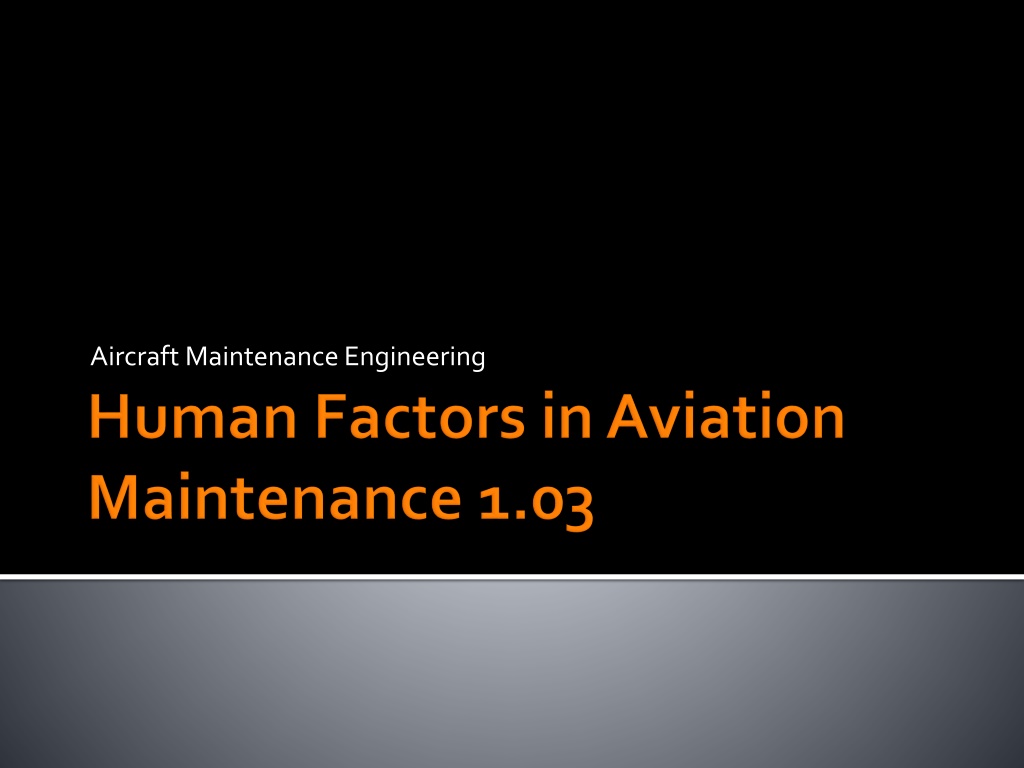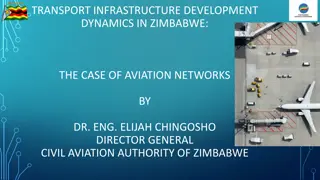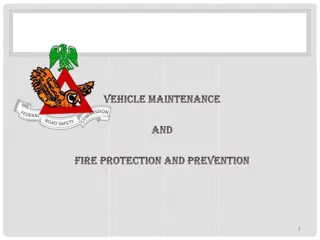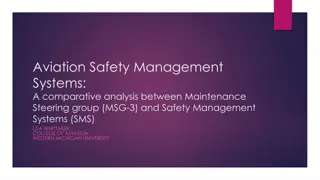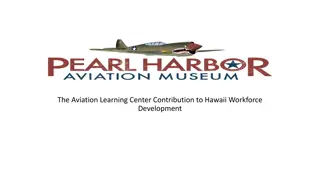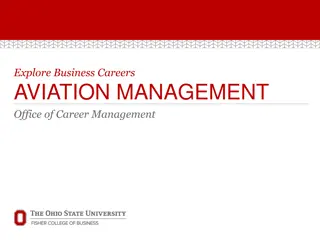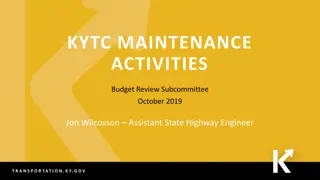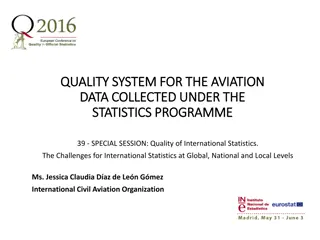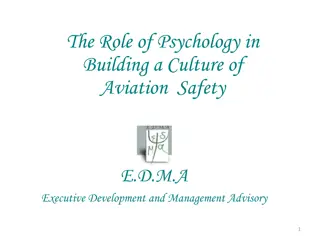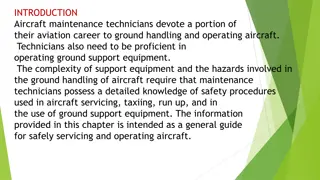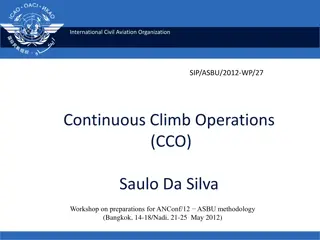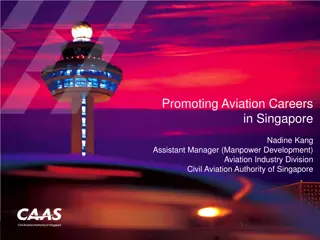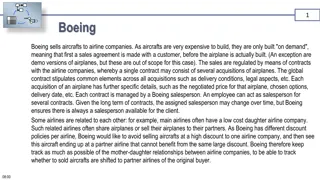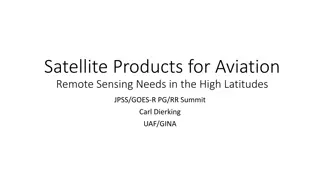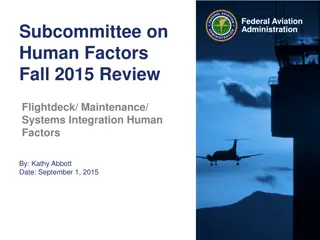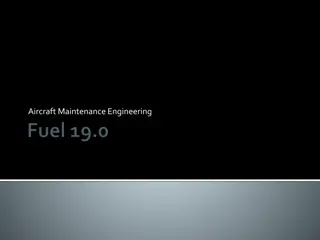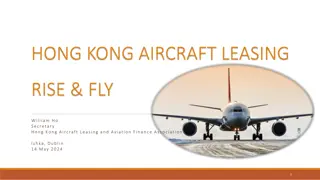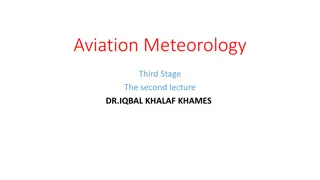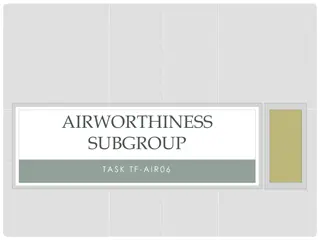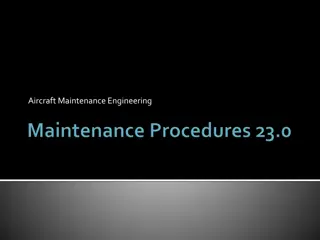Insights into Aircraft Maintenance Engineering and Human Factors in Aviation
Explore the crucial aspects of aircraft maintenance engineering, the reasons behind maintenance attributable accidents, and the impact of human factors in aviation maintenance. Discover the importance of training, communication, and organizational norms in ensuring high reliability and safety in the aviation industry.
Download Presentation

Please find below an Image/Link to download the presentation.
The content on the website is provided AS IS for your information and personal use only. It may not be sold, licensed, or shared on other websites without obtaining consent from the author. Download presentation by click this link. If you encounter any issues during the download, it is possible that the publisher has removed the file from their server.
E N D
Presentation Transcript
Maintenance Attributable Accidents Reasons Model Types of Errors Human Performance Training Communication Complacency Lack of knowledge Fatigue Lack of Resources Pressure Lack of Assertiveness Stress Lack of Awareness Norms High Reliability Organization Case Study 1 Case Study 2 Case Study 3 Rule Based Exercise Cube Exercise Decision Making Exercise
Human Factors in Aviation Maintenance 1.03 Maintenance Attributable Accidents Maintenance Attributable Accidents Estimates Fatal Accidents Accidents Reportable Incidents Incidents Causal Factors MAA
Human Factors in Aviation Maintenance 1.03 Maintenance Attributable Accidents Maintenance Attributable Accidents Estimates The Aviation Industry yearly estimates of accidents attributable to maintenance errors range from 6 to 25 % Fatal Accidents Accidents Reportable Incidents Incidents Causal Factors MAA
Human Factors in Aviation Maintenance 1.03 Maintenance Attributable Accidents Maintenance Attributable Accidents American Airlines 191 Estimates Fatal Accidents Accidents Reportable Incidents Incidents Causal Factors MAA
Human Factors in Aviation Maintenance 1.03 Maintenance Attributable Accidents Maintenance Attributable Accidents American Airlines 191 Estimates Fatal Accidents Accidents On May 25, 1979, an American Airlines (AA) McDonnell Douglas DC-10-10 crashed moments after takeoff from Chicago. All 258 passengers and 13 crew on board were killed, along with two people on the ground Reportable Incidents Incidents Causal Factors MAA The pylon, the rigging holding the engine onto the wing, had been damaged during an AA maintenance procedure. The procedure recommended by McDonnell Douglas called for removal of the engine prior to the removal of the engine pylon.
Human Factors in Aviation Maintenance 1.03 Maintenance Attributable Accidents Maintenance Attributable Accidents British Airways 5390 Estimates Fatal Accidents Accidents Reportable Incidents Incidents Causal Factors MAA On 10 June 1990,the cockpit window blew out at altitude after the wrong bolts had been used to secure it.
Human Factors in Aviation Maintenance 1.03 Maintenance Attributable Accidents Maintenance Attributable Accidents Reportable Incidents Estimates Fatal Accidents Accidents These are a close call or occurrence where the reporting will alert others in the organization to the potential hazard and improve the procedures, training and margin of safety in future situations. Reportable Incidents Incidents Causal Factors MAA This reporting process is the Safety Management System (SMS).
Human Factors in Aviation Maintenance 1.03 Maintenance Attributable Accidents Maintenance Attributable Accidents Estimates Fatal Accidents Accidents Reportable Incidents Incidents Causal Factors MAA
Human Factors in Aviation Maintenance CARs 726.07 (3) Maintenance Attributable Accidents Maintenance Attributable Accidents Estimates Fatal Accidents Accidents Reportable Incidents Incidents Causal Factors MAA [Maintenance] error is not the cause of the accident Photo: Mobile Device & AME Performing Maintenance The cause is to be found in whatever interfered with the performance at a critical moment, the outcome of which was an error. Jerome Lederer
Human Factors in Aviation Maintenance 1.03 Reasons Model Decisions Makers Defenses Unsafe Acts Line Management Accident Preconditions Preconditions Line Management Unsafe Acts Decision Makers Defenses Latent Unsafe Conditions Unsafe Acts & Latent Unsafe Conditions Window of Opportunity Outcome
Human Factors in Aviation Maintenance 1.03 Reasons Model Decisions Makers Defenses Unsafe Acts Line Management Potential Preconditions Preconditions Line Management Unsafe Acts Decision Makers Defenses Latent Unsafe Conditions Unsafe Acts & Latent Unsafe Conditions Window of Opportunity Outcome
Human Factors in Aviation Maintenance 1.03 Reasons Model Decisions Makers Defenses Unsafe Acts Line Management Potential Preconditions Preconditions Line Management Unsafe Acts Decision Makers Defenses Latent Unsafe Conditions Unsafe Acts & Latent Unsafe Conditions Window of Opportunity Outcome
Human Factors in Aviation Maintenance 1.03 Reasons Model Decisions Makers Defenses Unsafe Acts Line Management Potential Preconditions Preconditions Line Management Unsafe Acts Decision Makers Defenses Latent Unsafe Conditions Unsafe Acts & Latent Unsafe Conditions Window of Opportunity Outcome
Human Factors in Aviation Maintenance 1.03 Reasons Model Decisions Makers Defenses Unsafe Acts Line Management Potential Preconditions Preconditions Line Management Unsafe Acts Decision Makers Defenses Latent Unsafe Conditions Unsafe Acts & Latent Unsafe Conditions Window of Opportunity Outcome
Human Factors in Aviation Maintenance 1.03 Reasons Model Decisions Makers Defenses Unsafe Acts Line Management Potential Preconditions Preconditions Line Management Unsafe Acts Decision Makers Defenses Latent Unsafe Conditions Unsafe Acts & Latent Unsafe Conditions Window of Opportunity Outcome
Human Factors in Aviation Maintenance 1.03 Reasons Model Decisions Makers Defenses Unsafe Acts Line Management Potential Preconditions Preconditions Line Management Unsafe Acts Decision Makers Defenses Latent Unsafe Conditions Unsafe Acts & Latent Unsafe Conditions Window of Opportunity Outcome
Human Factors in Aviation Maintenance 1.03 Reasons Model Decisions Makers Defenses Unsafe Acts Line Management Potential Preconditions Preconditions Line Management Unsafe Acts Decision Makers Defenses Latent Unsafe Conditions Unsafe Acts & Latent Unsafe Conditions Window of Opportunity Outcome
Human Factors in Aviation Maintenance 1.03 Reasons Model Decisions Makers Defenses Unsafe Acts Line Management Window Preconditions Preconditions Line Management Unsafe Acts Decision Makers Defenses Latent Unsafe Conditions Unsafe Acts & Latent Unsafe Conditions Window of Opportunity Outcome
Human Factors in Aviation Maintenance 1.03 Reasons Model Decisions Makers Defenses Unsafe Acts Line Management Accident Preconditions Preconditions Line Management Unsafe Acts Decision Makers Defenses Latent Unsafe Conditions Unsafe Acts & Latent Unsafe Conditions Window of Opportunity Outcome
Human Factors in Aviation Maintenance 1.03 Types of Errors Types of Errors How Errors Occur Execution Errors Planning Errors Human beings brains are primarily emotional machines that have a secondary capacity to think & reason. Omission Sequence Errors tend to occur when negative emotions patterns cause us to develop rigid thinking patterns. Substitution Negligence This rigid thinking pattern limits the possible outcomes we allow for a given situation.
Human Factors in Aviation Maintenance 1.03 Types of Errors Types of Errors How Errors Can Be Avoided Execution Errors Planning Errors Once a negative emotion and thoughts are identified assign a value of belief 1-100% Omission Check all the distortions which may apply to your perception of the situation. All or nothing thinking. Over generalization Mental filter Discounting Positive attributes Jumping to conclusions Magnification & minimization Emotional reasoning Should statements Labeling Personalization & Blame Sequence Substitution Negligence
Human Factors in Aviation Maintenance 1.03 Types of Errors How Errors Can Be Avoided Types of Errors Execution Errors Cognitive distortion Checklist All or nothing thinking. You look at things in absolute, black & white. Over generalization You view negative events as a never ending pattern of defeat. Mental filter You dwell on negatives and ignore the positives. Discounting the Positives You insist that your accomplishments or positive qualities don t count. Jumping to conclusions Mind reading- you arbitrarily assume people are reacting negatively to you. Fortune telling- you arbitrarily predict that situations will turn out badly. Magnification & minimization You blow things out of proportion or shrink their importance. Emotional reasoning You reason from the way you feel. I feel like an idiot, so I must be one. Should statements You criticize yourself or others with statements like Should, Must, Ought, Have to . Labeling Instead of simply acknowledging, I made a mistake you tell yourself I m an idiot! . Personalization & Blame You blame yourself for something you weren t entirely responsible for. You blame others and overlook ways that you contributed to the problem. Planning Errors Omission Sequence Substitution Negligence
Human Factors in Aviation Maintenance 1.03 Types of Errors Types of Errors How Errors Can Be Avoided Execution Errors Planning Errors Reassess the situation substituting all possible positive alternatives an rate your belief with a value 1-100% Omission Sequence Revisit your original thoughts and emotions and describe your current perception of the trueness of your belief. Substitution Negligence Finally, indicate the improvement in the situation as a belief value of 1-100%.
Human Factors in Aviation Maintenance 1.03 Types of Errors Types of Errors Execution Errors Planning Errors Omission Sequence Substitution Negligence
Human Factors in Aviation Maintenance 1.03 Types of Errors Types of Errors Execution Errors Planning Errors Omission Sequence Substitution Negligence
Human Factors in Aviation Maintenance 1.03 Types of Errors Types of Errors Execution Errors Planning Errors Omission Sequence Substitution Negligence
Human Factors in Aviation Maintenance 1.03 Types of Errors Types of Errors Execution Errors Planning Errors Omission Sequence Substitution Negligence
Human Factors in Aviation Maintenance 1.03 Types of Errors Types of Errors Execution Errors Planning Errors Omission Sequence Substitution Negligence
Human Factors in Aviation Maintenance 1.03 Types of Errors Types of Errors Execution Errors Planning Errors Omission Sequence Substitution Negligence
Human Factors in Aviation Maintenance 1.03 Human Performance Training Human Performance Training Teamwork Leadership Time Perspective Paraphrase Recording Automatic Performance Conscious Performance Skill Based Rule Based Knowledge Based
Human Factors in Aviation Maintenance 1.03 Human Performance Training Human Performance Training Teamwork Teamwork Leadership There are three primary relationships related to collective endeavors. Time Perspective Dependent relationships I need you to give me what I want or need. Paraphrase Recording Automatic Performance Independent relationships I can achieve the my wants and needs on my own and I am willing to trade. Conscious Performance Skill Based Interdependent relationships We can achieve more results than individually possible by combining attributes and resources to our mutual benefit. Rule Based Knowledge Based
Human Factors in Aviation Maintenance 1.03 Human Performance Training Human Performance Training Teamwork Teamwork Leadership Time In an dependent relationship, the benefits of shared resources is a basic arithmetic expression of resources equaling a sum of results, this type of relationship is adds little value & may even be counter productive. 2 + 1 = 3 or 2 + -1 = 1 Perspective Paraphrase Recording Automatic Performance In an independent relationship, the benefits of shared resources is simply an addition of resources equaling a greater sum of results, this type of relationship is cooperation or transaction. 2 + 2 = 4 and 4 / 2 = 2 Conscious Performance Skill Based Rule Based Knowledge Based
Human Factors in Aviation Maintenance 1.03 Human Performance Training Human Performance Training Teamwork Teamwork Leadership Time In an interdependent relationship, the benefits of shared resources is not simply an addition of resources equaling a greater sum of results, this type of relationship is more than cooperation or transaction. 1 + 22 = 5. Perspective Paraphrase Recording Automatic Performance In a truly interdependent relationship the results are non-linear or even exponential. 22 + 22 = 8 Conscious Performance Skill Based Rule Based Knowledge Based
Human Factors in Aviation Maintenance 1.03 Human Performance Training Human Performance Training Teamwork Leadership Time Perspective Paraphrase Recording Automatic Performance Conscious Performance Skill Based Rule Based Knowledge Based
Human Factors in Aviation Maintenance 1.03 Human Performance Training Human Performance Training Teamwork Leadership Time Perspective Paraphrase Recording Automatic Performance Conscious Performance Skill Based Rule Based Knowledge Based
Human Factors in Aviation Maintenance 1.03 Human Performance Training Human Performance Training Teamwork Leadership Time Perspective Paraphrase Recording Automatic Performance Conscious Performance Skill Based Rule Based Knowledge Based
Human Factors in Aviation Maintenance 1.03 Human Performance Training Human Performance Training Teamwork Leadership Time Perspective Paraphrase Recording Automatic Performance Conscious Performance Skill Based Rule Based Knowledge Based
Human Factors in Aviation Maintenance 1.03 Human Performance Training Human Performance Training Teamwork Leadership Time Perspective Paraphrase Recording Automatic Performance Conscious Performance Skill Based Rule Based Knowledge Based
Human Factors in Aviation Maintenance 1.03 Human Performance Training Human Performance Training Teamwork Leadership Time Perspective Paraphrase Recording Automatic Performance Conscious Performance Skill Based Rule Based Knowledge Based
Human Factors in Aviation Maintenance 1.03 Human Performance Training Human Performance Training Teamwork Leadership Time Perspective Paraphrase Recording Automatic Performance Conscious Performance Skill Based Rule Based Knowledge Based
Human Factors in Aviation Maintenance 1.03 Human Performance Training Human Performance Training Teamwork Leadership Time Perspective Paraphrase Recording Automatic Performance Conscious Performance Skill Based Rule Based Knowledge Based
Human Factors in Aviation Maintenance 1.03 Human Performance Training Human Performance Training Teamwork Leadership Time Perspective Paraphrase Recording Automatic Performance Conscious Performance Skill Based Rule Based Knowledge Based
Human Factors in Aviation Maintenance 1.03 Human Performance Training Human Performance Training Teamwork Leadership Time Perspective Paraphrase Recording Automatic Performance Conscious Performance Skill Based Rule Based Knowledge Based
Human Factors in Aviation Maintenance 1.03 Communication Communication Advantages Listening Body Language Perspective
